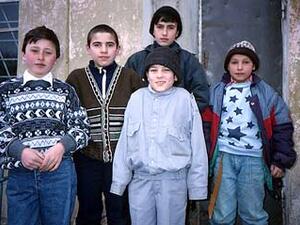Two-day meeting to pursue initiatives in dealing with displacement in the Commonwealth of Independent States
Two-day meeting to pursue initiatives in dealing with displacement in the Commonwealth of Independent States
Representatives from more than 60 countries and international organizations will meet in Geneva Thursday and Friday to discuss progress in efforts to resolve mass displacement in the Commonwealth of Independent States.
The Fifth Steering Group meeting of the CIS Conference Follow-Up Process is hosted by the United Nations High Commissioner for Refugees, the International Organization for Migration and the Organization for Security and Cooperation in Europe.
The CIS conference was convened in 1996 to address the problems of millions of people who had moved within or between the countries of the CIS following the end of the Cold War and the disintegration of the Soviet Union. This week's meeting, which concludes the conference process begun in 1996, will adopt a new framework designed to meet specific displacement challenges in a more focused manner.
"In the last four years, we have made significant progress putting in place laws on refugees and migration and government structures that will deal with mass displacements in the CIS. We hope to build on these successes," Assistant High Commissioner Søren Jessen-Petersen said in a statement Wednesday. "Indeed, one successful outcome of the Conference process often overlooked is the absence of dramatic developments to the contrary. Five years ago, there was considerable concern about massive population displacement and human suffering. Despite setbacks, this has largely been avoided."
Jessen-Petersen stressed the need to continue activities launched by the CIS Conference process as it seeks to adapt to shifting priorities within the region. "We feel that the process as a whole, with its preventive and solution-oriented approach, involving a broad selection of governments, international organizations and NGOs, addressing complex issues on a national, regional and international basis, could well serve as a model for resolving similar problems in other parts of the world."
He listed four main issues the conference process will concentrate on in the future: assuring continued focus on groups of concern, including refugees, internally displaced, illegal migrants, repatriants, formerly deported peoples and ecological migrants; migration management, including combating illegal migration and trafficking; sustaining and promoting activities of NGOs and civil society ; and implementing legislation.
He said that since 1996 a significant number of NGOs have been established and operational partnerships forged with international organizations. Close to 150 NGOs, many of which did not exist five years ago, are attending the meeting.
Since the post-Cold War era, more than half a million forcibly deported peoples, internally displaced and refugees have returned to their homes or former homelands in the CIS countries from both the CIS and from outside. This includes 260,000 Crimean Tatars banished from their homeland during the Stalinist purge half a century ago.


